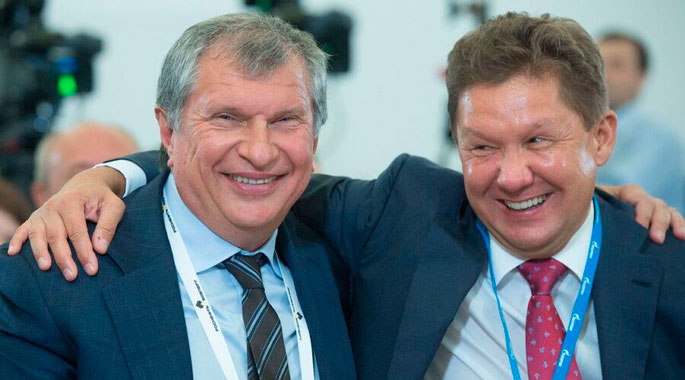Cramping the Style of Miller and Sechin
Alexei Miller of Gazprom, and Igor Sechin of Rosneft, have joined forces in their struggle against a law they just don’t like …

Miller and Sechin want financial transactions, real-estate transactions and intra-group transactions to be exempt from the law “On the Procurement of Goods, Works and Services by Certain Kinds of Legal Entities.” They outlined this request in a February letter to Prime Minister Dmitry Medvedev, who has already forwarded it for the “consideration” of Economic Development Minister Alexei Ulyukayev and Deputy Prime Minister Igor Shuvalov.
The public procurement law currently requires every state company to disclose in advance all relevant information concerning any upcoming transactions. The primary ideological thrust of the law is articulated in its very first article: “The objective of this Federal Law is to ensure the unity of economic space […], the development of honest competition, the openness and transparency of procurement, and the prevention of corruption and other abuses.” Miller and Sechin, it would seem, are planning to put paid to all of this – competition, openness, transparency, the fight against corruption, and everything else.
According to RBC, the business media group, Miller and Sechin have justified this initiative in a fashion that has become all too familiar of late: the yoke of Western sanctions is to blame for everything. A plethora of Russian leaders have learned to exploit this broken record, using it to mask their own inefficiency while simultaneously adding the state to the ranks of their eternal debtors.
The yoke of Western sanctions is to blame for everything
Miller and Sechin, too, are striving to capitalise on a life under sanctions: according to RBC, they believe that “the implementation of the law [on public procurement] in regard to purchases of financial services and other financial transactions concluded by companies affected by US and EU sanctions (Rosneft and individual Gazprom projects among them) serves to reduce the efficiency of those companies’ activities. In addition, it gives rise to the risk that the disclosed information may be used by US and EU regulatory authorities to verify the extent to which the companies are complying with the sanctions regime, and may lead to a tightening of sanctions and the application of more restrictive measures and penalties.”
Just for good measure, the authors of the letter have also blamed the procurement law for the devaluation of the rouble and rising loan interest rates. Says RBC: “The publication of information on transactions, their price parameters and counterparties will [according to Miller and Sechin] catalyse an increase in the cost of loans and exert a significant impact on the Russian financial market, causing fluctuations in exchange rate values and speculative borrowing.”
Miller and Sechin’s true motivations will no doubt be best understood by crime thriller aficionados: trying to save their skins, the oligarchs blame everything on the good guy (in this case, the procurement law) and do their utmost to set him up any way they can.
Contributing to the problem is the fact that – as acknowledged by the Accounts Chamber – the procurement law is virtually never strictly enforced. In July last year, Putin was told by Accounts Chamber chief Tatyana Golikova that “in 2014, random checks of ministries and agencies alone revealed violations to the tune of 39 billion rubles.” Golikova also admitted that “we didn’t inspect the institutions themselves but merely their principal administrators.” Experts observe that, even today, state-owned companies try to avoid competitive procurement, preferring to deal with their “daughters” and “granddaughters” instead.
The procurement law is virtually never strictly enforced
It’s clear that Miller and Sechin possess sufficient authoritative and administrative resources to discredit the procurement law to an even greater degree. And if Miller and Sechin’s insistent efforts prove successful, Article 3 of the law will effectively be turned on its head, so that it should now read:
1. In procuring goods, works and services, the ordering parties adhere to the following principles:
1) informational opacity of the purchase;
2) the parties involved shall enjoy no equality of rights, no freedom from discrimination, and no protection from unjustified restrictions on competition;
3) a purposeful purposeless and economically inefficient use of funds for the procurement of goods, works and services […] and the implementation of measures designed to reduce increase the outlays of the ordering party;
4) the absence introduction of restrictions on access to the procurement process by means of placing immeasurable demands on the parties involved.
In Putin’s Russia, being above the law is an important asset and a symbol of one’s initiation in to the caste of the elect. The choicest, legally unregulated cuts go to the president’s closest right-hand men: some, like Kadyrov, get an entire region to play with, while others, like Miller and Sechin, lay their hands on state companies comparable in size to entire industries. For a long time now, the “rules” of this “game” have brazenly trumped any Russian law, and the current regime, held together by omertà, is perfectly prepared to deal with dissenters by resorting to mafia methods.



